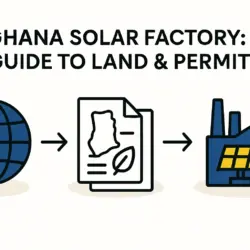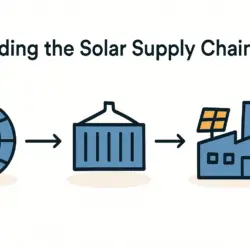In a pivotal step toward sustainable energy, the West African Power Pool (WAPP) is set to undertake its first-ever feasibility study on green hydrogen, aiming to address the region’s energy needs and reduce its reliance on fossil fuels.
The initiative follows a landmark agreement between WAPP and the Economic Community of West African States (ECOWAS), announced on the sidelines of the 2025 ECOWAS Sustainable Energy Forum (ESEF) in Abidjan, Ivory Coast.
Green Hydrogen: A Game-Changer for West Africa
Supported by the African Development Bank, the feasibility study will explore the potential of green hydrogen as a clean energy source in West Africa. This initiative could fundamentally reshape the region’s energy landscape by providing a sustainable alternative to traditional fossil fuels. Spearheaded by WAPP—an organization established to enhance electricity access through regional integration—the ambitious project represents a crucial step toward diversifying the region’s energy mix and ensuring long-term energy security.
Green hydrogen, produced by splitting water into hydrogen and oxygen using renewable energy, offers a viable solution to the region’s energy challenges. It can be used for electricity generation, industrial processes, and transportation, reducing carbon emissions and promoting sustainable development.
The study will assess the technical and economic feasibility of producing, storing, and distributing green hydrogen across West Africa. Its scope also extends to evaluating potential sites for renewable energy projects and identifying key stakeholders, from governments and private sector players to international partners.
WAPP’s Commitment to Regional Power Projects
Beyond the green hydrogen initiative, WAPP is actively involved in several other regional power projects aimed at enhancing electricity access and promoting sustainable energy in West Africa. These include the West African Gas Pipeline and Power Pool Project (WAGP), the Nigeria-Benin Interconnection Project, the Ghana-Burkina Faso Interconnection Project, and the Senegal-Mali Interconnection Project. These initiatives improve electricity supply, promote regional cooperation, and support the integration of renewable energy sources into the power grid. In parallel, ECOWAS is working to develop off-grid solar solutions across the region.
WAPP’s efforts align with the broader goals of ECOWAS, a strong advocate for sustainable energy development in the region. The ECOWAS Sustainable Energy Forum (ESEF), for example, provides a platform for stakeholders to discuss strategies for advancing renewable energy, energy efficiency, and clean cooking solutions.
By fostering collaboration among governments, development partners, and the private sector, ESEF aims to accelerate the transition to a sustainable energy future in West Africa. Other industry events, such as Intersolar Africa 2025, also play a crucial role by gathering hundreds of participants to help transform the continent’s renewable energy sector.
Challenges and Opportunities for Green Energy in West Africa
Despite the promising outlook, West Africa’s transition to green hydrogen and other sustainable energy sources faces several challenges, including inadequate infrastructure, limited financing, and regulatory barriers. However, the commitment from regional organizations like WAPP and ECOWAS, coupled with support from international partners, offers a clear path for overcoming these obstacles.
The success of the green hydrogen feasibility study will hinge on the collective efforts of all stakeholders. By leveraging the region’s abundant renewable energy resources, such as solar and wind, West Africa can position itself as a leader in the global energy transition.
Developing green hydrogen could also create new economic opportunities, including jobs and spurring the growth of local industries. Events like Solar Power Africa 2025 will further boost these prospects by convening key stakeholders to accelerate the adoption of photovoltaics, wind energy, and energy storage systems.
A Step Toward a Sustainable Energy Future in West Africa
The announcement of the green hydrogen feasibility study marks a pivotal moment in West Africa’s journey toward a sustainable energy future. As the region continues to grapple with the impacts of climate change and energy insecurity, initiatives like this offer a glimmer of hope.
By embracing innovative solutions and fostering regional cooperation, West Africa can pave the way for a cleaner, greener, and more resilient energy system. Successfully implementing green hydrogen projects could also enhance the region’s energy independence, reduce greenhouse gas emissions, and contribute to global efforts to combat climate change. As West Africa embarks on this transformative journey, the world will be watching closely, eager to see how the region harnesses its potential to shape a more sustainable and prosperous future.



